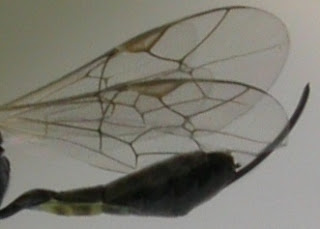Yorkshire Ichneumons
Saturday, 11 May 2013
Parasitoid of Olethreutes mygindiana
In May 2012, this 8mm long parasitoid larva appeared in a container that had housed a caterpillar of Olethreutes mygindiana. The fully-grown caterpillar had completely disappeared.
I suspect this solitary endoparasitoid to be one of the Lissonotinae (Banchinae) which usually attack young lepidopterous larvae but don't kill the host until it is fully grown.
It may well belong to the genus Glypta (Glyptini) which attack partially concealed larvae of various small lepidoptera, especially tortricids. I wonder if it is Glypta gracilis which has been described previously from this host.
Unfortunately the parasitoid died before it reached the adult stage.
Monday, 6 May 2013
Thursday, 25 April 2013
Diadegma from Luffia ferchaultella
This female Diadegma emerged from a Luffia ferchaultella case collected at Hollins Hall, Baildon, VC64 in August 2012.
I am still waiting to find out whether this is Diadegma naryciae.
I am still waiting to find out whether this is Diadegma naryciae.
Monday, 22 April 2013
Lysibia nanus (Gravenhorst, 1829)
I have also reared one this year from Cotesia melanoscela. which is a bit unusual from a solitary Cotesia but the male is completely distinctive from its genital claspers. The broken areolet on the forewing is also a characteristic.
Friday, 12 October 2012
Cotesia pilicornis - a parasitoid of Amblyptilia amblyptilia
Saturday, 10 December 2011
Charitopes carri (Roman),
 This Cryptine ichneumon was one of six which were observed exploring the bark crevices on a Sycamore trunk during the last weekend of October.
This Cryptine ichneumon was one of six which were observed exploring the bark crevices on a Sycamore trunk during the last weekend of October.The specimen was sent to Klaus Horstmann who kindly identified it for me.
The hosts are apparently lacewing larvae.
Saturday, 1 October 2011
Pholetesor circumscriptus

This microgastrine braconid is the thelytokous Pholetesor circumscriptus (Nees) was found, on 23rd September 2011, patrolling around Horse-chestnut leaves that were infested with Cameraria ohridella mines.
Subscribe to:
Comments (Atom)







